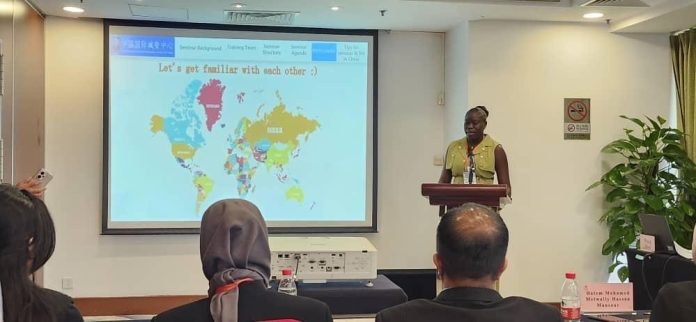By Ndey Sowe, Reporting from Beijing, China
Poverty remains one of the most pressing challenges confronting developing countries, which are home to more than 70 per cent of the world’s population, according to Ms. Jie Ping, Deputy Director General of the International Poverty Reduction Center in China (IPRCC).
Ms. Ping made the remarks on Tuesday, October 14, 2025, during the opening ceremony of a two-week seminar themed “Rural Development and Poverty Reduction for Officials from Developing Countries,” held in Beijing.
The seminar, which runs from October 14 to 27, is organised by the IPRCC and sponsored by the Ministry of Commerce of the People’s Republic of China. It aims to deepen participants’ understanding of China’s strategies and experiences in eradicating poverty while promoting balanced economic, social, and environmental development.
Founded in 2005, the IPRCC serves as a platform for China to share its experience in poverty reduction and development through South-South cooperation.
Ms. Ping emphasised that eradicating poverty has long been a shared human aspiration and remains central to achieving global development. “Behind many of the conflicts and dilemmas facing the world today lie issues relating to countries’ right to development and their chosen development paths,” she said.
Reflecting on China’s journey, Ms. Ping recalled that since the 18th National Congress of the Communist Party of China (CPC) in 2012, the country has developed a comprehensive framework of institutions, policies, and practices that shaped a unique approach to poverty reduction with “Chinese characteristics.”
She highlighted China’s landmark achievement in 2021, when it announced the elimination of absolute poverty nationwide. “Under current standards, 98.99 million rural residents were lifted out of hardship; 832 poverty-stricken counties and 128,000 villages were removed from the poverty list,” Ms. Ping said, calling it “a historic feat that marked the completion of the arduous task of eliminating absolute poverty.”
By achieving this milestone, she noted, China met the poverty reduction target of the United Nations 2030 Agenda for Sustainable Development ten years ahead of schedule. “This is the largest-scale poverty reduction initiative the world has ever seen,” she added.
However, Ms. Ping stressed that eliminating absolute poverty is “not an end, but a new starting point for further endeavours.” Following its success, China launched a five-year transition period to consolidate poverty alleviation gains and advance rural revitalisation.
“We have built monitoring and support systems to prevent any large-scale resurgence of poverty,” she explained. “Over six million people at risk of slipping back into poverty have been identified and assisted. Employment among formerly poor populations has remained stable at over 30 million, while income growth in former poverty-stricken counties continues to outpace the national rural average.”
As the five-year transition period concludes in 2025, Ms. Ping said China has strengthened guarantees for education, healthcare, housing, and drinking water safety. The country has also maintained steady economic and social progress in formerly impoverished regions.
“China’s experience and achievements have been widely recognized by the international community,” she stated. “As a key member of the developing world, we stand ready to share our experience and contribute to building a community with a shared future for humankind.”
She illustrated China’s global cooperation efforts with vivid examples: “When the cliff-crossing highway in Uganda becomes a ‘road of development’ carrying hope, when the rice fields in Fiji turn into ‘fields of cooperation’ witnessing friendship, and when every village in the Global South writes its own development story—only then can human civilization truly thrive together in harmony.”
Echoing Ms. Ping’s remarks, Mr. Hatem Mohamed Metwally, Vice Chairman of the Technical Committee of the National Alliance for Popular Action Development in Egypt, commended China’s remarkable poverty alleviation success.
“China’s achievement in lifting more than 800 million people out of poverty stands as one of the most significant accomplishments in modern human development—one we aim to study closely and learn from,” Mr. Metwally said.
He added that Egypt has also placed poverty reduction and sustainable development at the heart of its national agenda. “This effort is supported by ambitious programs and strong civil society engagement,” he noted, citing Egypt’s ongoing cooperation with the Chinese Embassy in Cairo, the New Hope Chinese Group, and the National Alliance for Popular Action Development as examples of fruitful collaboration.
The seminar continues this week with participants from various developing nations exploring China’s poverty reduction models and their applicability in different contexts.


















